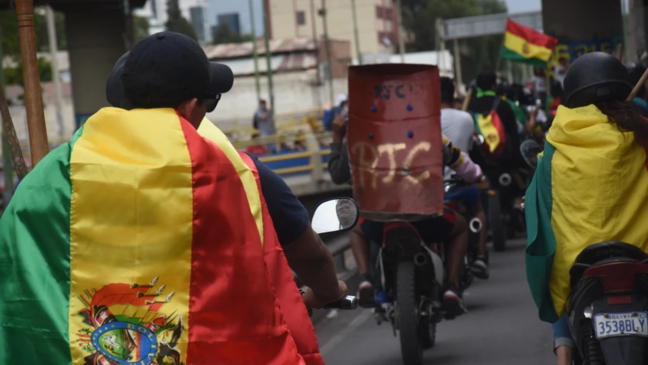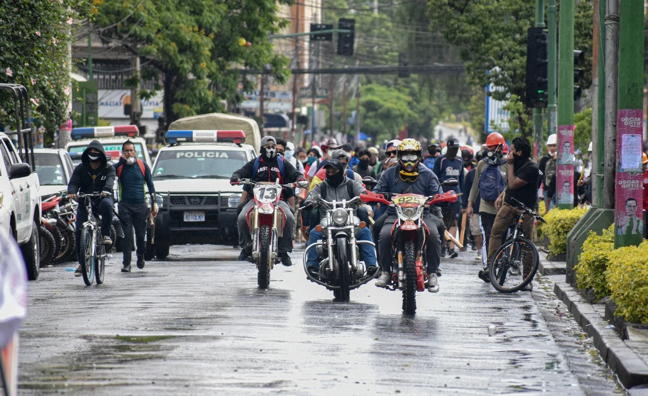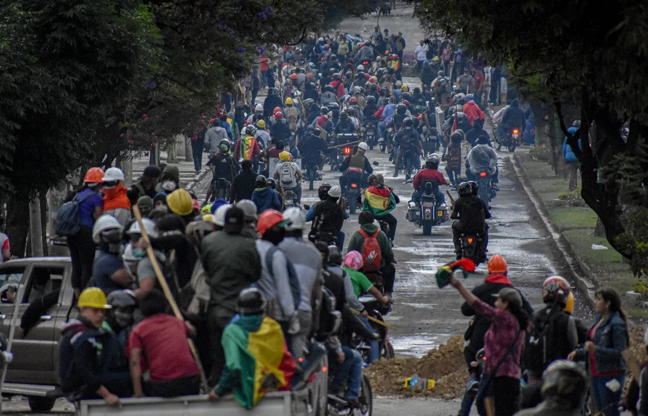
(above) Ayar Wari/VICE News
Bolivia's Biker Squads Are Like a 'Hyper-Armed Version of the Proud Boys'
August 31, 2020 - Original article: www.vice.com
Human rights organizations say the motorcycle gangs, or "motoqueros", are acting in the interests of the conservative interim government.
by Amy Booth
Luis, the 23-year-old leader of a squadron of 50 bikers, cruised through the streets of the Bolivian city Cochabamba on a recent morning. Armed with coshes and shields, their faces covered by bandanas and ski masks, they were looking for marches, roadblocks, and anything else that might spell trouble.
His squadron is part of the Cochabamba Youth Resistance (known as RJC, its Spanish initials). Luis, who asked VICE News not to use his real name, says their purpose is to “defend the city, defend democracy, and not allow any abusers to seize power.”
It all started for Luis when he blocked the street outside his house with his family and neighbours toward the end of 2019. They were protesting against the left-wing government of former President Evo Morales after accusations that he had committed fraud in the general election last October. “It was peaceful,” he said about the protest. “People were bringing each other soft drinks.”
He got more involved with the RJC after supporters of Morales marched to Cochabamba a week later, clashing with anti-Morales protesters at roadblocks. “They came and destroyed cars, threw stones at houses where people lived, and that angered a lot of people,” said Luis. “The ‘Resistance’ was there to combat that.”
Over 30 people were injured across the country that day, including some with gunshot wounds, according to local media.
Yassir Molina, aged 25, RJC’s founder, told VICE News he started the group the day after the voting fraud allegations were made in October. “I went to look for ballot boxes with a few of my companions. We threw a few stones, we were there to try and get the ballots, but we were repressed because we weren’t organized,” he said. The next day, his group arranged an open meeting in a public square, and from there, their numbers grew.
“After a while, there were loads of us,” said Luis. “That’s when the squadrons started.”
(below) Biker group RJC on the streets of Cochabamba, Bolivia, in November 2019. Photo by Ayar Wari for VICE News.

The RJC is the largest of the “shock groups” born after the allegedly fraudulent elections last year. Molina said the group currently has around 5,000 members in Cochabamba alone, and estimates suggest there are around 20,000 nationwide. He added that there were now similar collectives in all of Bolivia’s nine departments.
They say they’re defending democracy. But activists and human rights organizations say these collectives have a disturbing track record of racism, sexism and violence, as well as a close relationship with security forces.
They are operating as organized vigilante groups, using violence and intimidation to silence critics — and are being actively encouraged by Bolivia’s interim government, according to human rights lawyers at Harvard Law School’s International Human Rights Clinic.
“People are scared to vote, scared to express their opinions,” said Thomas Becker, one of the authors of the International Human Rights Clinic’s report. “If they express opposition, they’re afraid they’ll be dragged through the streets.”
He added that there was “real concern” that the upcoming elections scheduled for October 18 wouldn’t be free orfair.
Racism has surged in Bolivia since Morales left power, say observers. He was Bolivia’s first indigenous president in a majority-indigenous country. Under the rule of his left-wing Movement Towards Socialism (MAS) party, poverty fell dramatically, indigenous people’s rights made unprecedented gains, and the economy boomed.
He was replaced by far-right interim president Jeanine Áñez, who is accused of presiding over human rights violations, including two massacres of indigenous protesters following the election last year. During the post-election protests, officers were filmed cutting the wiphala — an important indigenous symbol that is part of the Bolivian flag - off their uniforms. Numerous human rights organizations including the U.N. High Commission for Human Rights have expressed alarm over an increase in racial abuse.
Molina referred to indigenous protesters as “MAS-ista hordes”, while Luis described those at a recent series of roadblocks as “people who don’t have much education.”
“They’re relying on racist tropes that we’ve seen before,” said Becker. “It’s this notion that indigenous people are savage or uneducated that fuels a lot of these attacks.” Many observers are especially concerned about attacks against indigenous women, who in some cases have been physically attacked by motorbike gangs while they were just walking down the street.
“They’re like a hyper-racist, hyper-armed version of the Proud Boys,” Becker said, in reference to the American right-wing group with a penchant for street fighting.
Áñez herself is a conservative Christian who has called indigenous people “satanic”. Luis Fernando Camacho, a current presidential candidate, proclaimed that Pachamama, the Andean mother earth, would never return to the presidential palace.
A December report by the Inter-American Commission on Human Rights described the RJC as an “armed, motorized group” that multiple witnesses had accused of “exercising violent control over and intimidating broad swathes of society”. It added that the RJC and other groups were acting in association with, or at least tolerated by, security forces. Although Molina and Luis deny that the RJC are working with the police, protesters frequently report seeing them together.
(below) Biker group RJC on the streets of Cochabamba, Bolivia, in November 2019. Photo by Ayar Wari for VICE News.

Members have also attacked human rights defenders and journalists. In February, journalist Adair Pinto said that RJC members approached him inside a bar, showed him a photo of his sister, and threatened to rape her.
He left shortly after but claimed that as he sat in a taxi, RJC member Roger Revuelta reached through the window and stabbed him multiple times. Pinto believes Revuelta intended to murder him. Molina claimed to local media that the attack was personal, not political, in nature.
On another occasion, a woman allegedly affiliated with the RJC attempted to enter the Cochabamba human rights ombudsman’s office with a loaded gun and a grenade of tear gas
Molina denied that RJC members carry lethal firearms but conceded that they carry “modified pyrotechnics” made at home.
Daniel Soliz, an indigenous rights activist, was surrounded by a group of some 200 RJC members during a protest in December, he told VICE News. For around five hours, they called them “fucking indians” and other racist insults, hurling urine and eggs at them as the police looked on.
Molina said that the RJC doesn’t condone racist insults and had “sanctioned” its members for using them.
The next election had been scheduled for May 3 but it was postponed first to September 6, then October 18 because of the COVID-19 pandemic. The decision sparked a wave of roadblocks in August from social movements and Morales supporters, demanding elections sooner.
When VICE News asked Luis if the left-wing party MAS could win the upcoming elections, he responded: “Unfortunately, we can’t allow that.”
Cover: Members of the RJC group ride through the streets of Cochabamba, Bolivia. Credit: Ayar Wari for VICE News.